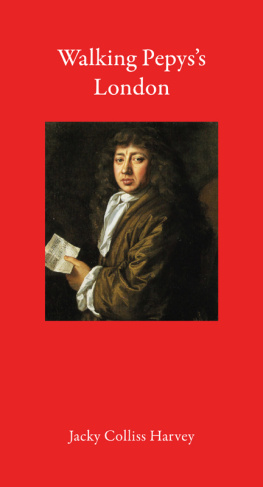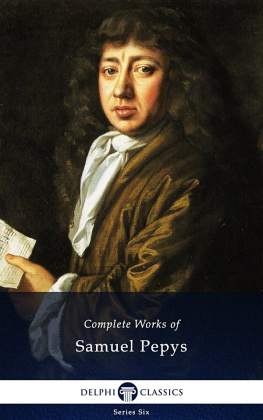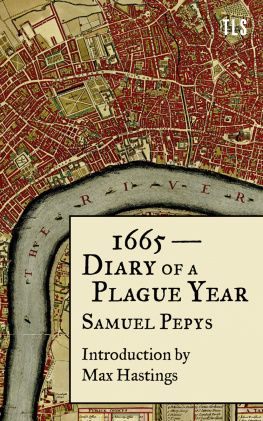The Dark Side of Samuel Pepys
The Voluptuary
God forgive me, I could not think it too much; which is a strange slavery that I stand in to beauty, that I value nothing near it.
The Diary of Samuel Pepys 6th September 1664
* * *
The Wife Beater
Thereupon she giving me some cross answer I did strike her over her left eye such a blow as the poor wretch did cry out and was in great pain.
The Diary of Samuel Pepys 19th December 1664
* * *
The Philogynist
God forgive me, I do still see that my future is not to be quite conquered, but will esteem pleasure above all things. music and women I cannot but give way to, whatever my business is.
The Diary of Samuel Pepys 28th February 1666
* * *
The Voyeur
After dinner I by water alone to Westminster to the parish church, and there did entertain myself with my perspective glass up and down the church, by which I had the great pleasure of seeing and gazing at a great many very fine women.
The Diary of Samuel Pepys 26th May 1667
* * *
The Groper
my wife, coming up suddenly, did find me embracing the girl with my hand under her skirts.
The Diary of Samuel Pepys 25th October 1668
* * *
The Rapist
Alone with her, I tried to do what I wanted, and against her struggles I did it, though not to my satisfaction.
The Diary of Samuel Pepys 20th December 1664
* * *
The Dark Side of Samuel Pepys
Societys First Sex Offender
Geoffrey Pimm
First published in Great Britain in 2017 by
Pen & Sword History
an imprint of
Pen & Sword Books Ltd
47 Church Street
Barnsley
South Yorkshire
S70 2AS
Copyright Geoffrey Pimm 2017
ISBN 978 1 52671 729 0
eISBN 978 1 52671 731 3
Mobi ISBN 978 1 52671 730 6
The right of Geoffrey Pimm to be identified as the Author of this Work has been asserted by him in accordance with the Copyright, Designs and Patents Act 1988.
A CIP catalogue record for this book is available from the British Library
All rights reserved. No part of this book may be reproduced or transmitted in any form or by any means, electronic or mechanical including photocopying, recording or by any information storage and retrieval system, without permission from the Publisher in writing.
Pen & Sword Books Limited incorporates the imprints of Atlas, Archaeology, Aviation, Discovery, Family History, Fiction, History, Maritime, Military, Military Classics, Politics, Select, Transport, True Crime, Air World, Frontline Publishing, Leo Cooper, Remember When, Seaforth Publishing, The Praetorian Press, Wharncliffe Local History, Wharncliffe Transport, Wharncliffe True Crime and White Owl.
For a complete list of Pen & Sword titles please contact
PEN & SWORD BOOKS LIMITED
47 Church Street, Barnsley, South Yorkshire, S70 2AS, England
E-mail:
Website: www.pen-and-sword.co.uk
Introduction
A sk his contemporaries what they thought of Samuel Pepys and they would have told you that he was an upright and God-fearing citizen, renowned for his integrity, hard work and unblemished reputation. By dint of unswerving application to his duties he had risen from humble (if well-connected) beginnings to be amongst the most powerful men in the land, known and respected by everyone with whom he came into contact, including even King Charles II himself. Without Samuel Pepys, England may not have had the navy that, for centuries after his death, would preserve the country from foreign invasion and secure the greatest empire the world had ever known. The historian Arthur Bryant writing in 1938 described it as his supreme achievement that by virtue of which his country still rules the sea. As Secretary of the Royal Navy, a Member of Parliament, Master of Trinity House and President of the Royal Society, Pepys exerted his influence over every aspect of seventeenth century public life.
And yet we know from his personal diary, into which he carefully recorded every daily event in his public and private life over a period of more than nine years from January 1660 to May 1669, that there was a darker and much less reputable side to his character. For reasons which will almost certainly forever remain a mystery, Samuel Pepys recorded in unabashed and graphic detail, behaviour that might make even a modern case-hardened tabloid journalist blush. At first glance, it appears that it was never intended that the world at large would have access to this document the whole text was written in shorthand, whilst very personal (and potentially highly embarrassing) episodes were first written in a strange mixture of foreign languages, before being transcribed into their encoded format, what modern code-breakers might call double encryption.
All the various translators of the diary have shied away from including plain English renditions of these episodes in their editions. Pepyss diary was first made available to the general public during the nineteenth century, both in a notoriously bowdlerized edition by Lord Braybrooke and in a more accurate but censored version by Henry B. Wheatley, which he published over a number of years in seventy-three volumes. It was the early 1970s before a complete edition was published by Latham and Matthews, and even then, the offending passages were only rendered into their strange mix of foreign languages, without translation or explanatory notes.
Henry Wheatley also wrote two additional works on the subject; Samuel Pepys and the World He Lived In published in 1889 and Pepysiana subtitled Additional Notes on the Particulars of Pepys Life and on some Passages in the Diary . The Victorians were notoriously shy when it came to discussing the subject of sex, and Mr Wheatley was no exception. Pepys diary is full of women and his relationships with them thirty-one female domestic servants alone are mentioned in varying degrees of detail, including an affair with one that very nearly destroyed his marriage. In Pepysiana fifty-one pages are devoted to notes about Friends and Acquaintances yet Women occupy rather less than a single page, in which Pepys is largely blameless and the characters of a few women are viciously assassinated; for example: Mrs. Betty Lane, afterwards Mrs. Martin, who figures so largely in Pepyss pages, is the most objectionable of all. There is no evidence that she had any virtue to lose, and her conduct throughout is very revolting.
However, in a couple of matters, Wheatley allows a mild criticism of Pepys behaviour; With regard to the affair with Mrs Bagwell, which lasted for much of the diary period, it appears that Pepys actually did seduce her, and that in a way much to his discredit. The affair with the maid Deb Willett, whom Pepys systematically and forcibly seduced and which nearly destroyed his marriage, is described as affording a very curious illustration of Pepyss code of morals.









